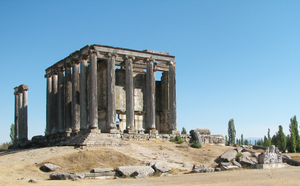About a year ago my father asked me to join him in the weekly newsletters that he wrote to his former athletes and students. Knowing I was teaching myself ancient Greek, he asked me to produce a word for him to accompany each communication. We rarely missed a week, as he was committed to the self-inflicted Sunday deadline we imposed on ourselves, and we made it to 47 newsletters before he passed away last October.
I didn't think much of it in the beginning, but over time I began to enjoy meeting the deadlines with him. To honor this collaboration, I have decided to republish my "Greek for the Week" series over the next 47 weeks. It's a small offering, but perhaps it will grow on you over time.

1
γίγνομαι /gi.gno.mai/ verb, 1st person, singular number, active voice, indicative mood, present tense
It means
- of people, "to come into being", "to become" or "to be born"
- of things, "to be produced" or
- of events, "to take place".
In English we memorize a verb by its infinitive because, presumably, it holds the same form for all conjugations. In ancient Greek, the infinitive is conjugated and so the norm is to memorize the first person, singular verb form. For example, the active, indicative, present form of the infinitive of γίγνομαι, "I become" or "I am becoming", is γιγνώσκειν "'to become' in the present time we are speaking".
To complicate things further, γίγνομαι is named a "deponent" verb, which means it possesses a middle / passive voice, but no active voice (middle and passive voices typically conjugate with the same endings), and so its middle voice "I am becoming for myself" is translated in the active voice "I am becoming" and so on (so I fibbed a bit above calling γίγνομαι "I become" active).
Deponent or not, I get hung up on the passive voice all the time as one can usually only distinguish between middle and passive based on the context of the sentence.
For example, let's consider an easier example with the word ἐσθίω /es'thi.o/ "I eat". In ancient Greek the active voice would be ἐσθίω "I eat" or "I am eating" while the middle voice would be ἐσθίομαι "I eat for myself" as is the passive voice ἐσθίομαι "I am being eaten"! Argh!
Note the stem ἐσθί- in the active voice takes the omega +ω while the middle / passive takes +ομαι, like we saw in γίγνομαι (γίγν- + ομαι).
2
ἡ ὄψις - (opsis), noun, feminine; meaning vision, sight
ἡ γνώμη - (gnome), noun, feminine; meaning mind, opinion, judgement, purpose, intelligence
I encountered these two words used together while translating a passage by Thucydides. Trapped in enemy territory, the invading Athenians had just left on foot into hostile countryside following their complete navel defeat by the hands of the Syracusans (Syracuse was a mighty Corinthian Greek colony located in south-eastern Sicily).
ὄψις and γνώμη were the words used to describe the great pain the soldiers were feeling both visually (their dead comrades) and in their minds (their dread of what is likely to become of them).
As it turns out, most of these Athenian soldiers were eventually killed defending themselves or captured and enslaved.
3
ἡ ἀλήθεια (alḗtheia), noun, feminine - meaning "truth"
In addition to its gravity, I really like this word because it's pleasing in form and sound.
4
ἡ μοῖρα - (môi.ra) noun, feminine - meaning fate, lot, destiny; death
Quoting from one of my textbooks
“μοῖρα is part:
- a portion of land,
- a division of people,
- a political party,
- a geographical or astronomical degree, and then
- the lot or share which falls to each person, especially in the distribution of booty.
The word means the lot or rightful portion of an individual, but from this it came to mean the doom of death, mankind’s inescapable lot ...”
5
Χίμαιρα (kʰí.mai̯.ra) – Proper Noun
The Chimera was a monstrous fire-breathing hybrid creature of Lycia in Asia Minor, composed of the parts of more than one animal. It is usually depicted as a lion, with the head of a goat protruding from its back, and a tail that might end with a snake's head.
You can see the presumed origins of the Chimera fable in Lycia on a hill that still produces a constant flame, burning day and night, and that once was bright enough to be used for ancient nighttime naval navigation (it’s located west of Antalya in southern Turkey).
The flames are caused by leaking methane that spontaneously combusts when it contacts the air. Now the parks caretakers use it to boil their tea water.

6
This week is about friendship.
φιλέω (phi-le-o) verb - I love, kiss; am used to; am a friend of, like (remember we learn ancient Greek verbs in the 1st person singular)
ἡ φιλία (phi-li-a), noun, feminine - friendship
ὁ φίλος (phi-los), noun, masculine - friend
φίλος η ον (phi-los), adjective (masc., fem., neu.) - dear, one's own
Here's to φίλοι friends and φιλία friendship!
7
As the elections approach, we present:
῎Αρχω (archo), verb - meaning “be first”
-- whether of time: begin, make a beginning or
-- of a place or station: govern, rule.
It’s participle (verbal adjective) is ἄρχων (archon), and when used in the masculine as a noun means “ruler”, “commander”, or “archon”. Archon is the title of the top administrative magistrates in ancient Athens and many other settlements.
Extra Credit: Punctuation Marks:
You may have noticed the punctuation marks on the words presented. One is an accent mark: acute ´ or grave ` or circumflex ῀. In ancient Greek it represents where to place a change in pitch, either up (acute), down (grave), or up-down (circumflex). These days a simple change in stress is considered sufficient.
The other punctuation mark is a breathing mark. ῾ is called a rough breathing mark which indicates to add an h-sound before the vowel that follows, or in the case of a ρ (rho), a rh-sound. ᾽ denotes a smooth breathing; so, do nothing extra.
So ῎Αρχω indicates a smooth breathing with the accent of the first vowel.
All words that begin with a vowel must have a breathing mark, as do words that begin with ρ (rho). A further complication occurs with diphthongs, which are two consecutive vowels said together, and for which the breathing mark is placed on the second vowel (I digress).
An example I like is the word ῥήτωρ, which, without the rough breathing, would be something like "r-A-tor", but with the rough breathing is "rho-A-tor" or orator! Often Greek can just jump through to us like this!
8
The big gun, let's put this one in the books
ἡ αρετή (ar-ete'), noun, feminine - excellence, goodness, moral virtue
My textbook states its meaning well:
“Arete is a very important word and concept in the Greek language and in the Greek mind. It is the word that comes to mind when we think of the Greek ideal - striving for perfection of the mind and body, and for the fullest development of human capabilities.”
9
I came across this passage in Thucydides that uses “arete” in a sentence.
The story is of Nikias, the great Athenian general who was put to death by the Syracuse leaders after his surrender in Sicily during the Peloponnesian War. Thucydides writes that of all the people he knew in his time, Nikias was the least worthy of such a fate ...
... Διά τήν πᾶσαν ἐς ἀρετήν νενομισμενην ἐπιτήδευσιν.
… Because of having practiced his whole practice into arete
In other words, Nikias’ way of being consistently strove for arete - virture and excellence - like no other person Thucydides knew in his time.
10
νόμος, ὁ (no’-mos) - noun, masculine
• Usage, Custom, Law, Convention, Observance
νομίζω (nomizo) - verb (derived from νόμος)
• Acknowledge, Think, Believe, Treat as Customary, Observe, Practice, Adopt
These days it is common to first translate νόμος as "law", however, in ancient Greece the concept and language of law was certainly less developed than today and to translate the word as “custom” or "customary" seems rather understandable and even satisfying (even if the Greeks wrote their νόμοι in stone).
11
A clear insight into the ancient Greek psyche is provided in this fragment by Thucydides.
After the moral defeat at Syracuse in Sicily, the Athenians were adrift and feeling vulnerable. Not expecting defeat, they had not planned for the possibility they would be left without a fleet, money, and enough young men to protect them.
Despite their anguish, they resolved to right the situation with confidence because
“... ὅπερ φίλει δήμοσ ποιείν, ἔτροιμοι ἧσαν εὐτακτείν.”
"… the very thing the ‘demos’ loves to do, they were ready to behave in a disciplined manner."
And by summer's end they had rebuilt their fleet and mined enough silver to fill their treasury.
12
One of my favorite words
ἡ δίκε (di-ke) - noun, feminine - justice, satisfaction, penalty, lawsuit
from it is derived
ὁ Δικαστής (di-kas-tis) - noun, masculine - Juror
In ancient Athens, juries were made up of up to 500 men, chosen by lot, fifty from each of the ten δέμος (demos) or tribes. Only males over 30 were eligible. A pool of 6000 were randomly drawn annually, from which an elaborate system was used for jury selection that was designed to eliminate bribery. The jury heard the case, gave a verdict, and set the penalty using suggestions from the prosecution and the defense.
Pericles introduced pay for the jury, perhaps the first example of government paying for public service, and for it, attempts to ostracize him were made.
13
During our family trips to Greece in the 70's we often stayed at a hotel chain named the Xenia.
ὁ ξένος (xenos) - noun, masculine - stranger, guest-friend, foreigner
From my textbook:
The word applies to persons or states bounded by treaties of hospitality. When applied to a person, it means guest or host (more commonly guest). The relationship between guest and host was a sacred one and very important for survival in a land that was divided into many separate political entities. To harm or betray one's guest or host was considered a serious and unholy crime.
The stranger, wanderer or refugee is also a ξένος as is any stranger or foreigner that is not a native or citizen. The word is used as the opposite of φίλος, that is a ξένος is not a member of the family. Thus, in ξένος we have a word that means both friend and stranger.
14
ὁ Κοινός (koi-vόs) - noun, masculine – common, mutual, shared, joint
There are five major dialects of Ancient Greek:
• Ἀτθίς (Atthis) or Attic: spoken in Athens and nearby – the dialect most learn first, including myself,
• Δωρίς (Dor-is) or Doric: spoken in the Peloponnese and Northwest Greece,
• Ἀιολίς (Aio-lis) or Aeolic: spoken in Lesbos (Samos), and with variations in Boeotia and Thessaly,
• Ἴας (Ias) or Ionic: spoken on the coast of Asia Minor and on some of the neighboring islands,
• Κοινή (Kion-a) or Koine: the common dialect. Koine is not a combination of the others, but is mostly Attic with some Ionic influence.
Koine spread across the Greek world starting in the time of Alexander and eventually replaced the local dialects beginning in that 4th century. It is the language of the New Testament.
15
ὁ λόγος (logos) - noun, masculine,
is derived from the verb λέγω (le-go) which means I say or I speak.
In business school a lecturer translated λόγος to us as “reason”. Since then I have learned its meaning is far broader. In early ancient Greek it means “word”. Later, in the Bible, it means “Word” of God.
My textbook gives the following 10 possible uses - you will observe they often involve saying or speaking or communicating:
- Computation, reckoning, account
- Relation, correspondence, ratio, proportion
- Explanation, plea, case; statement of a theory, argument, thesis, reason, formula, law, rule of conduct
- Debate (internal): reason, abstract reasoning
- Continuous statement, narrative, story, speech
- Verbal expression, common talk
- A particular utterance: saying, oracle, proverb
- The thing spoken of: subject matter (in art, the subject of a painting)
- Expression, speech: intelligent utterance: language
- The Word or Wisdom of God
16
Ancient Greek has four words for "good" (all masculine)
ὁ ἀγαθός (agathos) - good, like our English good.
ὁ ἐσθλός (esthlos) - equivalent to ἀγαθός, but mainly poetic.
ὁ κάλος (kalos) - properly meaning beautiful referring to people or things. Morally it means virtuous and honorable, noble deeds. It was often added to a name as a token of love.
ὁ χρήστος (krestos) - good in the sense of useful or serviceable.
In modern Greek κάλος = ἀγαθός, and beautiful = ὀμορφη.
17
Βούλομαι (bo-lo-mai) – verb, I wish by choice or preference versus desire and
Βουλεύω (boo-le-uo) – verb, I take counsel, deliberate, I resolve
From Βούλομαι comes the feminine noun ἡ Βουλή (boolay), which means
(1) will, determination, ruling, decision, verdict and
(2) the Council or Senate of Athens, referring to the famous council of 500 established by Cleisthenes in 507 BC.
From Βουλή, Βουλεύω is derived which means, in addition to take counsel or deliberate, to be a member of the Βουλή.
18
A request came in for the word "determination"
The Oxford dictionary has two definitions
- firmness of purpose; resoluteness
- the process of establishing something exactly by calculation or research
We saw the answer to (2) last week. Βουλή (bool-ay) means council, will, determination, decision, verdict, and later Senate. So, it relates to our English verb "to determine" something.
But what about (1) "firmness of purpose"? I'm still searching for an answer.
19
Lately I've been translating portions of Plato's Protagoras and in particular the part where, at Hippokrates' request, Soctrates, will introduce Hippokrates to the famous sophist Protagoras.
Socrates probes Hippokrates with questions targeting exactly what training / learning Hippokrates expects to receive by spending time with Protagoras.
In the passages this word surfaces often; one that remains familiar today.
ἡ ἐπιστήμη (e-pis-te-me) - noun, feminine - meaning understanding, professional skill, knowledge, science
20
A quick one this week, I "ran" across this word the other day and thought it appropriate.
It's a regular -ω verb, as they say. Most ancient Greek verbs are -ω verbs, the other form being -μι.
τρέχω (trecko) - verb, I run
τρέχ - root
τρέχ-ω - I run
τρέχ-εις - you run
τρέχ-ει - he, she, it runs
τρέχ-ομεν - we run
τρέχ-ετε - you run (pl)
τρέχ-ουσι(ν) - they run
τρέχ-ειν - to run (infinitive)
21
I did some “light” reading this week consuming a chapter of “Early Greek Thinking – The Dawn of Western Philosophy” by Martin Heidegger. It’s not for everyone. :-)
The chapter is a lecture named ἀλήθεια, “truth”, a word I have introduced previously. Here Heidegger analyzes this tiny Fragment 16 by Heraclitus, an important 6th-5th century BCE Greek thinker from Ephesus (Ephesus is located on the coast of western Turkey just south of Izmir).
τό μή δυνόν ποτε πῶσ ἄν τις λάθοι;
How can one hide himself before that which never sets? (Keils-Kranz translation)
The focus of the analysis is about "someone hiding". λάθοι, is a 3rd person singular present optative conjugation of λαωθάνω, meaning I am concealed or escaping notice “potentially” or “hypothetically” (as per the Optative mood).
Λάθοι is related to the word λήθη, which means "concealment". Heidegger examines (at length) the contrast between λήθη, “concealment”, and ἀληθῆ, “un-concealment”. The “dude” can talk.
He concludes that, for the ancient Greeks,
ἀλήθεια, "truth" = that which is unconcealed.
I rather like that.
Addendum
This remains a difficult fragment for me to translate (but perhaps I just edged closer).
τό μή δυνόν = the thing not plunging or entering. Τό is neuter article in gender and has a Nominative (subject) or Accusative (object) form. It’s probably Accusative making the phrase “τό μή δυνόν “ the object of what follows (When you find an article before a verb like this it turns the verb into something like the English gerund, an -ing ending, so “the (neuter) it plunges = the (thing) plunging).
Μή = not.
ποτε = once or ever
πῶσ = how?
ἄν τις λάθοι = could, would, should anybody or somebody be concealed?
“How could someone be concealed” + “the (thing) not plunging ever?”
Clearly for an English translation a connector is missing between these two phrases, but that’s Greek, they somehow knew. Keils-Kranz chose “before that” meaning “facing that” or “in front of that” as opposed to time.
“How could someone be concealed” (before) “the thing not plunging ever?”
22
If you studied with a Sophist, you might be trained in these skills
-
ὁ λογισμός (log-is-mos) = ?
-
ἡ ἀστρονομία (astro-nomia) = ?
-
ἡ γεωμετρία (geo-metria) = ?
-
ἡ μουσική (mou-sika) = ?
-
Arithmetic, related to the word λόγος, logic
-
Astronomy
-
Geometry
-
Music
23
This week I came across the word for the Greek “Assembly”.
ἡ ἐκκλησία (ek-kle-sia), noun, feminine
It is derived from
(1) ἐκ, which is a preposition meaning “out” or "out of" and which always modifies a phrase in the genitive case, the genitive indicating motion "away from", and
(2) καλέω, which is a verb meaning "I call" or "I summon" (and sometimes “I command”).
So, for the ancient Greeks, “Assembly” means a "calling out (away from)" or "summoning out (away from)" to do the work of government.
24
A successful sea merchant turned statesman, Solon lived in Athens in the late 8th to early 7th century BC and is perhaps most celebrated for successfully resolving a severe crisis caused by growing and unsustainable wealth inequality among citizens.
An important philosophy in Solon’s time was “living in the mean” and as such these famous quotations are attributed to him'*':
μηδέν ἂγαν – Νot one thing very much (or nothing in excess)
and
γνῶθι σεαυτόν - Κnow yourself!
γνῶθι is a second person, active voice, aorist tense (simple past), imperative mood of γιγνώσκω, meaning "I come to know" or "I perceive".
'*' Most famously these quotations were written on the Temple of Apollo at Delphi long after Solon. There remains a debate on the attribution of these quotations. For example, “Know thyself” is sometimes attributed to Thales of Miletus. My source comes from a book I own, Solon of Athens: Poet, Philosopher, Soldier, Statesmen, and this book I do recommend for the story of Solon is wonderful.
25
Socrates did not record his teachings and most of what we know of him comes from the writings of his two famous students, Plato and Xenophon. Xenophon writes this about Socrates and Greek virtue in Memorabilia.
καὶ διαλεγόμενον κάλλιστα περὶ ἀρετῆς
Quite literally, “and conversing beautifully concerning arete”
26
History Repeats?
I came across this passage where Xenophon is discussing the "Thirty", a band of tyrants that took over Athens for a short period just after the end of the Peloponnesian War.
Xenophon says:
… ἐπεὶ γὰρ οἰ τριάκοντα πολλους μεν τῶν πολιτῶν καὶ οὐ τοὺς χειρὶστους ἀπένκτεινον, πολλοὺς δε προέτρεποντο αδικεῖν ...
Let’s break it down:
First note there is a μεν … δε which signals an “on the one hand” … “on the other hand” construction. In this case it’s emphasized further with the πολλους μεν … πολλοὺς δε construction “many (people) on the one hand” … “many (people) on the other hand”.
ἐπεὶ γὰρ οἰ τριάκοντα πολλους μεν τῶν πολιτῶν καὶ οὐ τοὺς χειρὶστους ἀπένκτεινον
οἰ τριάκοντα is the subject “the Thirty”
ἀπένκτεινον is the verb “they killed”
πολλους is object #1 “many (people)”
τοὺς χειρὶστους is object #2 “the worst (people)”
τῶν πολιτῶν = “of the citizens” goes with πολλους
ἐπεὶ γὰρ are particles that translate roughly “for since / when / after that”
“On the one hand, the Thirty killed many of the citizens and not the worst (ones)”
πολλοὺς δε προέτρεποντο αδικεῖν
οἰ τριάκοντα is the implied / reused subject “the thirty”
προέτρεποντο is the verb “they urged on / impelled”
πολλους is the object “many (people)”
αδικεῖν is the infinitive “to be unjust”
“On the other hand, they (the Thirty) urged many people to be unjust”
Putting it back together
“The Thirty killed many of the citizens, and not the worst (ones), and they urged many people to be unjust (commit crimes)”
As an example of how translation is slippery, would my translation below be wrong?
“The Thirty killed their enemies and encouraged their allies to do the same”
The E.C. Marchant circa 1925 translation on the https://perseus.fufts.edu site is
“… the Thirty were putting to death many citizens of the highest respectability and were encouraging many in crime …”
27
A lighter post this week. The Greek word for color is
τό χρῶμα (chroma) - noun, neuter
There are many English derivatives of this word, beginning with Chrome.
Regarding hue versus brightness, the Greek language is deficient in color related words.
For example, μέλας (melas) meaning black, dark, obscure is used to describe wine, blood, a wave, water and so forth.
28
Post 6 introduced the word φίλος (filos), meaning friend. Let’s introduce
ἡ σοφία (sophia), noun, feminine, which means wisdom.
The Greeks put them together to form the verb
φιλοσοφέω (filosofιow), verb, meaning “I am a friend of wisdom" or “I live a life of philosophy".
29
The Greeks adopted their alphabet from the Phoenicians as early as the ninth century BCE. The letters of the Phoenician alphabet all represented consonants, but the Greeks re-assigned the value of some letters to represent vowels and added some letters.
The early Greek alphabets differed strongly from each other, with respect to both the inventory and shape of the symbols. The East-Ionic alphabet, the language of Herodotus, was eventually adopted throughout the Greek world; in Athens, it was adopted for official state documents in 403/402 BCE.
The division between upper and lower cases is not ancient: lower case letters were introduced in the ninth/tenth centuries CE by Byzantine scholars; the Greeks themselves only wrote in capital letters. The Greeks also did not avail themselves systematically of punctuation or word divisions. Both were introduced by the same Byzantine scholars.
Breathing marks and accents were introduced during the Hellenistic period by scholars working in the Library of Alexandria and advanced, again, by the Byzantine scholars.
30
Living in the 6th century BCE, Solon strongly believed the good life was achieved by “striving for the mean” or “doing nothing in excess”
About three centuries later, Aristotle made the doctrine of opposites moral, stating
῾μεσότης τις ἄρα ἐστὶν ἠ ἀρετή στοχαστική γε οὖσα τοῦ μέσου.
My simple, literal translation1 is
Arete (Virtue) is therefore any central position (mean)
being able to hit the mean
Here are two “book” translations I found.
Virtue (Arete), in the sense that it is aimed at the mean, is the essence of the mean.
Virtue (Arete), therefore, is a mean state in the sense that it is able to hit the mean.
The “book” translations are not necessarily wrong any more than mine is right, but the slippery slope of translation is evident.
1 Ignoring the particle γε which exists as a connector between the two phrases and is typically translated as “at any rate” or “at least”.
31
In Socrates Apology by Plato, Socrates asks "how can one know if death is a bad thing?"
He elaborates:
καίτοι πῶς οὐκ ἀμαθία ἐστίν αὔτη ἠ ἐπονείδιστος, ἠ τοῦ οἴεσθαι εἰδέναι ἄ οὐκ οἶδεν;
My literal translation:
And further how is this not shameful ignorance, the ignorance to think to know things not known?
An accredited translation (Fowler, 1966):
And is not this the most reprehensible form of ignorance, that of thinking one knows what one does not know?
32
In Socrates Apology, Plato recounts in detail Socrates arguments to defend himself against his accusers.
While working through the Apology, I thought this word was interesting:
Ἀφίημι (aphiemi) verb, meaning I release, I let go, I neglect. Or in a court of law, I acquit.
For example, Socrates says:
Εἰ με νῦν ὐμνείς ἀφίετε Ἀνυτω ἀπιστήσαντες ...
If now you acquit me
having disbelieved Anytos (the prosecutor) ...
He continues …. I shall carry on doing exactly what I have been doing.
We know how that went ;-)
33
The word ἀρετή (Arete), meaning excellence or virtue, is of primary importance to ancient Greek thought and being.
Let’s direct our attention to ἀρετή once again as Socrates continues explaining his position to his jurors saying:
¨Οὐκ ἐκ χρημάτων ἀρετὴ γίγνεται, ἀλλ᾽ ἐξ ἀρετῆς χρήματα καὶ τὰ ἄλλα ἀγαθὰ τοῖς ἀνθρώποις ἅπαντα καὶ ἰδίᾳ καὶ δημοσίᾳ.῾
“Arete does not come from money, but from arete comes money and all the good things as a whole for mankind, for oneself and for the state.”
Clearly, Arete is not a means to an end, it’s a way of being.
34
More from Plato’s Apology. Socrates is unrelenting in distancing himself from his jurors.
νῦν οὖν, ὦ ἄνδρες Ἀθηναῖοι, πολλοῦ δέω ἐγὼ υπερ εμαυτου αππολογεισθαι, ως τις αν οιοτο, αλλα υπερ υμων, μη τι εξαμαρτητε περι την του θεου υμιν, εμου καταχηφισαμενοι.
“Now certainly, oh Athenian men, I am far from speaking in my defense, as some might think, but on behalf of you, for by condemning me you might err concerning the gift god gave to you.”
Ouch!
35
Plato used αὐτός poetically when defining beauty, κάλλος (kallos)
… αὐτὸ καθ᾽ αὑτὸ μεθ᾽ αὑτοῦ μονοειδὲς ἀεὶ ὄν, …
... itself by itself together with itself being always uniform, ...
αὐτός is the third person pronoun meaning he, she or it.
αὐτός, αὐτή, αὐτό - he, she, it
When combined with a noun in the nominative case it means “self”
ἀνήρ αὐτός - a man himself,
and when used with a noun and its definite article it means “the same”.
ὀ αὐτός ἀνήρ - the same man
in Plato's sentence κάλλος was stated earlier and is implied making αὐτό translate to "(it)self"
36
One Greek word for illegal or lawless is παράνομος (para-nomos) where πάρα means "besides" or "to the side of" and νόμος means law or custom.
Of particular interest is, when used as an adverb, παράνομως (paranomoos), it refers to a decree stating it is illegal to try people en masse (in Athens at least).
Παράνομος surfaces in Plato's Apology when Socrates is giving examples of times he fought for justice at the risk of personal peril. In one example he describes a situation where ten generals are accused failing to collect the dead from a sea battle and are being tried as a unit. Socrates protested citing παράνομως, but it eventually happened regardless.
This seems to me to be an advanced concept (and protection) of an individual's rights ... straight from the 5th century BC or earlier.
In other words, remarkable!
37
We have heard about Solon, the famous Athenian statesman of the 6th century. Among his many skills, Solon was a renowned poet and orator, and Solon used these skills to sway the Athenians to his thinking.
I was drawn to this short passage some years ago, well before I started studying ancient Greek. It is a metaphor for “living by the mean” by Solon.
ἐξ ἀνέμων δὲ θάλασσα ταράσσεται
ἤν δέ τις αὐτὴν μὴ κινῆι, πάντων ἐστὶ δικαιοτάτη.
By the wind the sea is stirred, but whenever it is
Not disturbed, of all things it is the most just.
Armed with my acquired knowledge of ancient Greek, I recently revisted this translation by Ron Owens.
First τις (some/any-one/thing) is masculine and agrees with the wind. The most common translations of τις are, "some" or "any" wind versus "whenever", a rarer translation (Perhaps Dr. Owens was being poetic and no doubt his version is a valid one).
Second, δικαιοτάτη is a superlative derived from δίκαιος which means just, honest, and upright, but other translations might be "civilized" (Homer and later), "well-balanced" (Xenophone), and "moderate" (Thucydides).
It's easy for us to quickly jump to the common translation of δίκαιος as "just" because it's a well understood and familiar concept to us (I do it too). Could it be too modern of a term in this case, much like νόμος means mean "law" and "custom"?
So, in the spirit of the Mean my translation is
The sea is stirred by the wind,
but if some wind does not disturb it,
of all things it is the most balanced.
Note 1: Dr. Ron Owen’s book on Solon is fabulous: https://www.amazon.com/Owens-Ron-Solon-Athens-Philosopher/dp/B017PHLNHY
Note 2: Thanks to my tutor Polly Coote for help with the enormities and subtleties of the language, and in this case the variations on the translation of δίκαιος.
38
I learned the ancient Greeks have a verb that means “I live in a democracy”!
Πολιτεύομαι (ploiteuomai)
It is derived from the word πολις (city), implying a Greek democratic city of which over 1300 have been identified and classified based on the ancient literature, supplemented by physical evidence when it exists.
39
The word ὔβρις, ἡ (hubris), noun, feminine, is well known.
Merriam-Webster defines hubris as "exaggerated pride or self-confidence"
My short "yellow" ancient Greek dictionary states "aggression, violence, humiliation, insult"
My book on the statesman Solon says
"This word is used to signify the abstract concepts of "willful or wanton violence", "insolence" or "impudence", which are often used to describe the outcomes, or consequences, of the prideful or passionate disregard for others, and in particular a reference to disregarding the gods."
So, it would seem the very ancient word ὔβρις refers specifically to the damage caused by those that disregard others (or the gods).
40
λόγος, ὁ (logos), noun, masculine, is a slippery word
It can mean speech, tale, word; account; argument; reason; idea, design.
In Lidell & Scott, the traditional authoritative dictionary of ancient Greek, λόγος is defined as the
- word by which inward thought is expressed and
- inward thought or reason itself.
I came across it twice this week, used in different contexts.
The first reference is when Socrates is suggesting to his prosecutor Μελητος that he should have produced witnesses against him "in his speech", and if he forgot, to produce them now.
ἐν τῳ ἑαυτοῦ λογῳ (“in the speech of himself” or “in his speech”)
A few sentences later λόγος appears again in a in hypothetical reference to those, through contact with Socrates, who corrupted themselves and those that did not, stating why they may have reason to help him:
ἄν λόγον ἔχοιεν βοηθοῦντες (the corrupted "would have reason helping me" ... to protect themselves), and
τίνα ἄλλον ἔχουσι λόγον? ("what other reason do the uncorrupted have" to help me other than doing the right and just thing)
Perhaps Socrates is the slippery one!
41
One goal for learning ancient Greek was to understand how different the original text is from the translations. Here is a simple example I recently noticed.
Socrates says the following regarding presenting family and friends to act as character witnesses in his defense.
... οὒ μοι δοκεῖ καλὸν εἶναι ἐμὲ τουτῶν οὐδεν ποιεῖν ...
Word by word this says,
"… not to me it seems good to be me of these things not one to do" or, rearranging slightly
"… it does not seem good to me for me to do any of these things"
The translation I referred to says:
"I think it is not right for me to do any of these things"
To substitute the word “good” for “right” is a simple example of a translator's license and influence.
It’s clear the translator chose “right” = “correct” or “proper” rather than “just”, but in ancient Greek “good” and “right” are used often and explicitly.
"Good" is καλός and means beautiful, good, fine, creditable; honorable
"Right" is most closely associated with δίκαιος meaning just, honest, upright.
Plato could have easily chosen δίκαιος, but he didn't, he chose καλός.
42
Here is another use of the word arete (ἀρετη) from Plato’s Apology.
Socrates is taunting his jurors, specifically those that might feel superior to others when they are not. Socrates lists ways in which they might feel superior.
“… εἴτε σοφίᾳ εἲτε ἀνδρειᾳ εἲτε ἂλλῃ ῃτινιοῦν ἀρετῃ …”
"… whether wisdom or manliness or whatever other virtue …"
Arete can mean courage, excellence, quality, and virtue, and in this case it is used as part of an enumeration of virtues as opposed to moral virtue with a capital V.
43
---- Greek for the Week #43 ---- Ready
δίκη (dike), justice.
At the end of Plato's Socrates’ Apology, there is a passage full of the use of the word "justice", tightly packed together.
Socrates is making the case that he has seen many "beg" for acquittal and that he would never do such a thing as it is wrong. And he chides his jurors to not stoop to such things.
οὐ γὰρ ἐπὶ τοὐτῳ κάθηται ὁ δικαστής, ἐπὶ τῳ καταχαρίζεσθαι τὰ δίκαια, ἀλλ᾽ ἐπὶ τῳ κρίνειν ταῦτα, καὶ ὁμωώμοκεν οὐ χαριεῖσθαι οἶς ἄν δοκῇ αὐτῳ, ἀλλὰ δικάσειν κατὰ τοὺς νόμους
"… for the juror should not be seated to bestow a favor with respect to just things, but to judge just things, and he swore not to do a favor at his whim, but to be a juror by the laws."
Note, ἡ δίκη = just, lawsuit, penalty, legal satisfaction, and so we have
ὁ δικαστής = the juror, singular, masculine (a person), nominative = subject
τὰ δίκαια = just things, plural, neuter (things), accusative in this this case, and interpreted as "with respect to" = object of καταχαρίζεσθαι "to bestow a favor"
κρίνειν = to judge or decide, infinitive
δικάσειν = to be a juror, infinitive
And another word we have seen many times
νόμους = laws or customs, plural, masculine, accusative = object of "to be a juror"
…
Sparing you the Greek, here is another a fun quote from the same passage:
Socrates also said, related to begging for acquittal, that he observed many on trial pleading and fearing some terrible afterlife if they should be convicted and killed, as if, somehow, they would be immortal if they were spared.
This sarcastic Socrates at his best, "you are going to die, maybe now, but certainly later" and "you don't know what dying is like - might be nice", so "let's focus on the merits of your crime and dispense with everything else".
44
ἂριστος, η, ον (aristos) adjective
In the masculine and feminine forms ἂριστος refers to a person of noble birth or similar, and pre 5th century is probably devoid of any moral content*.
In the neuter form its use appears to be solely adjectival and as such is used to describe an action or something as being the best or most excellent*.
So "best" is a good, loose, translation.
Obviously, we have many modern terms that are derived from ἂριστος - aristocrat - aristocracy - and so forth.
But in its origin, it just meant the "best" of any kind.
- Owens "Solon of Athens" 2010
45
ἡ πόλις (polis), noun, feminine
The Greek word polis is as fundamental as any word to describe the ancient Greek view of themselves. It's commonly translated as city-state by modern practitioners, but that term implies more self-autonomy than many true ancient polies may have achieved or even desired. This said, the term represents what embodied an ancient Greek city.
Owens describes it as a word signifying "an independent polity consisting of an urban center and adjacent agrarian land holdings; varying in size from the large polis of the Athenians, which incorporated the whole of Attika, to quite small states such as Potidea. In general, the governing structures of most poleis were oligarchical, and some were tyrannies, and, in all cases, citizenship was restricted to free men only and in most cases with attendant property qualification"*.
This said, many had constitutions and were democracies or at least governed as a group of equal peoples with universal laws.
As it turns out over 1300 Poleis have been identified as cataloged in the tremendous work named “An Inventory of Archaic and Classical Poleis" published in 2004, a result of 10 years of study by a multidisciplinary team of scholars. Their goal was to determine what a polis meant to the people living in them without a priori preconceived notions.
Inspired by this work I created a map-focused app based on data from the polis inventory. If you are interested in learning more, I offer my recent post in Electrum Magazine at http://www.electrummagazine.com/2021/12/an-interactive-mapping-app-for-an-inventory-of-archaic-and-classical-poleis/. The app, named Polis Inventory, is free and works on almost any Apple device, including a desktop.
- Solon of Athens, Owens 2010
46
Dίκη, η (di-ke), noun, feminine is an important word meaning justice, lawsuit, legal satisfaction, or penalty.
In Plato's Euthyphro, Socrates discusses murder and its consequences saying it is only necessary to judge the act:
εἲτε ἐν dίκῃ ἒκτεινεν ὁ κετείνας εἲτε μή
whether the one having killed, killed in justice, or not
… and if it was not a just killing, then it does not matter if the killer is from your household (father, mother, brother, sister, etc.), one is obliged to prosecute!
47
In Plato's Phaedo, as recounted by Socrates friend Phaidon to Ekhekrates, Socrates is preparing to die.
Surprisingly, the word used to describe his poison is not hemlock, it is:
φάρμακον, τό (far-macon), a neuter noun, meaning poison, drug, remedy or potion.
It's easy to connect φάρμακον with the roots of our pharma-words like pharmacology, pharmacy, and so forth.
The following is interesting as well:
"We are nowhere told it was hemlock, but that would be the obvious drug. It has been argued that hemlock causes dreadful convulsions, which Plato does not record to show Socrates' mastery over his body. This may be true, but it now appears that there were locally available Greek hemlocks which did not have such violent effects." – from JACT Greek Course "The Intellectual Revolution, selections from Euripides, Thucydides and Plato"
R.I.P. Socrates









